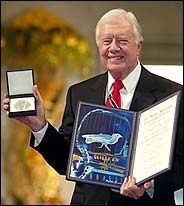
In Oslo, Former President Jimmy Carter accepted the Nobel Peace Prize today, saying that war might "sometimes be a necessary evil," but it is always an evil, "never a good."
 |
| Agence France-Presse |
| Carter Accepts Nobel In Oslo, Former President Jimmy Carter accepted the Nobel Peace Prize today, saying that war might "sometimes be a necessary evil," but it is always an evil, "never a good." |
OSLO, Dec. 10 — Former President Jimmy Carter accepted the 2002 Nobel Peace Prize today with a declaration that although war might "sometimes be a necessary evil," it is always an evil, "never a good."
"We will not learn to live together in peace by killing each other's children," he added in a solemn ceremony in which he accepted a Nobel gold medal and diploma. The award also includes $1 million in cash.
Mr. Carter repeated the view that he expressed on Monday that Washington should work with the United Nations toward a peaceful resolution of tensions with Iraq.
He said the United States, as the last superpower, had "not assumed that super strength guarantees super wisdom."
The 78-year-old former president warned: "Instead of entering a millennium of peace, the world is now, in many ways, a more dangerous place. The greater ease of travel and communication has not been matched by equal understanding and mutual respect."
On Monday, speaking at a news conference, Mr. Carter expressed a belief that the Iraqi situation could be solved peacefully. but he largely avoided any overt questioning of current United States policy toward Iraq.
Mr. Carter said that the weapons inspections under way in Iraq were important, and that the involvement of the United Nations in that effort was prudent and just.
"What I interpret as the official decisions of our government," he said, "are completely compatible, at least at this point, with what I have proposed for the last three or four months."
But Mr. Carter also offered an appraisal of those inspections that differed from some of the pessimistic ones that the Bush administration had given in recent days.
"I think at this point, in my opinion, Iraq has complied," Mr. Carter said, adding that he did not have access to all of the information the Bush administration might have.
He also said that if the United Nations Security Council ultimately judged Iraq to be in compliance, "I see no reason for armed conflict."
Mr. Carter's selection as the winner of this year's peace prize came against the backdrop of the American conflict with Iraq. When the selection was announced in October, Gunnar Berge, the prize committee chairman, said the decision should be seen as a rebuke of President Bush's threats of an American military strike.
Today Mr. Berge called it "one of the real sins of omission" that Mr. Carter was not included in the 1978 prize given to the Israeli prime minister, Menachem Begin, and President Anwar el-Sadat of Egypt for signing the Camp David accords that Mr. Carter brokered.
"Jimmy Carter should, of course, have been awarded the Nobel Peace Prize a long time ago," Mr. Berge said.
Mr. Carter's presidency, from 1977 to 1981, was a troubled one, and he lost his effort to win a second term in a landslide defeat to Ronald Reagan.
But he said on Monday that the prize would help shift attention toward "the more favorable things" in his administration's record, including the Camp David accord.
He also defended the United States when a French journalist said many Europeans believed that American policy toward Iraq was driven by oil.
"Anyone who claims that the United States is trying to get cheap oil — free oil — by invading Iraq is foolish," Mr. Carter said. "I know my country. I know my people. And I can assure you that is not the policy of my government."